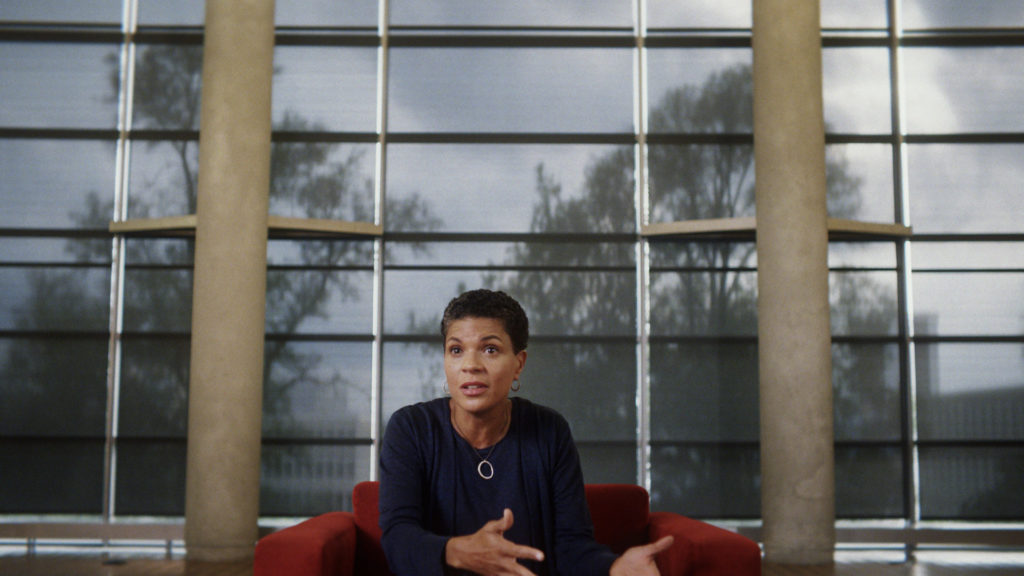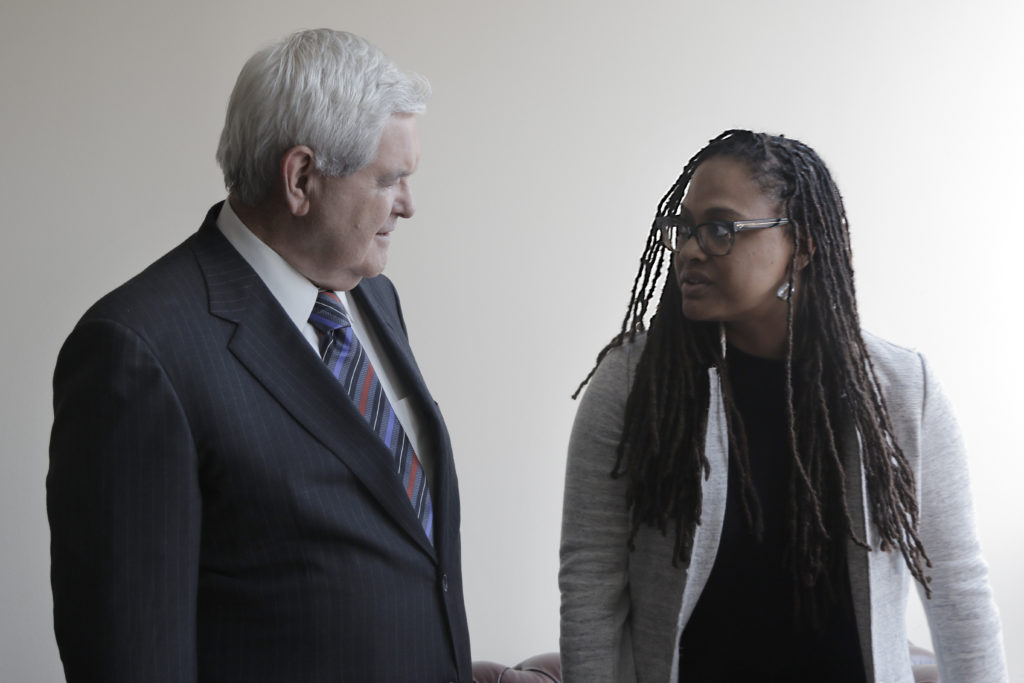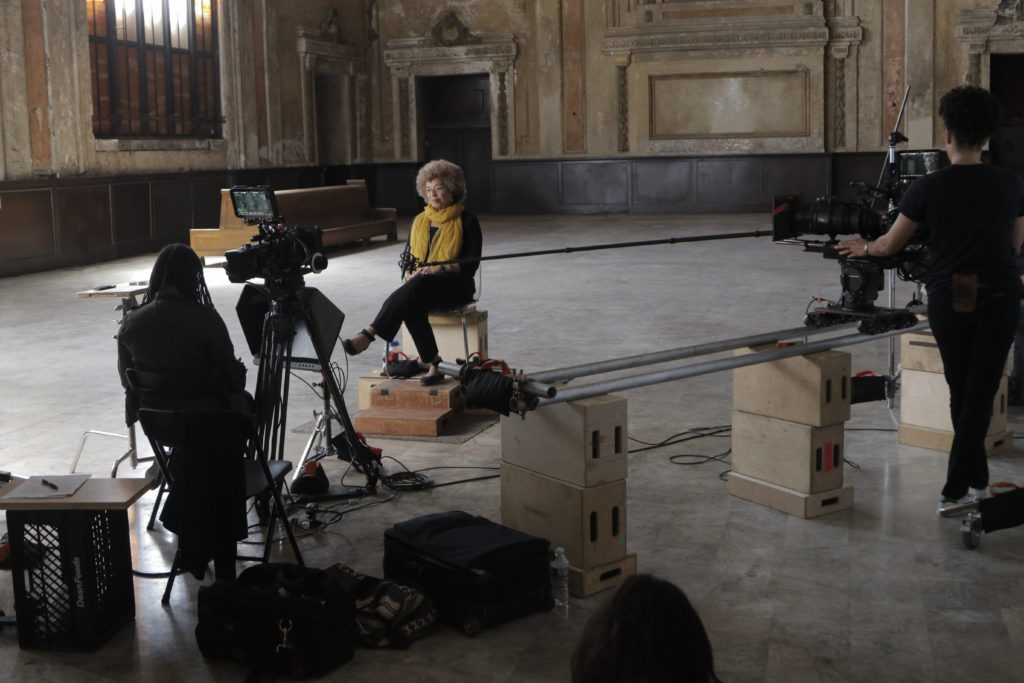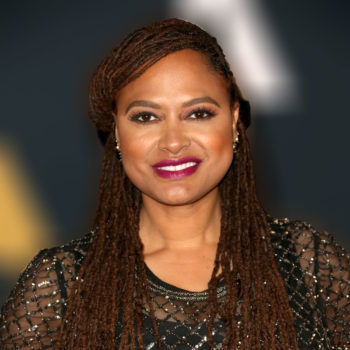In 2012, Ava DuVernay became the first African-American to win Best Director at Sundance and in 2014, she earned raves for her civil rights drama “Selma,” which was up for an Oscar for Best Picture. (Be sure to check out our chat with the film’s star David Oyelowo.)
Her latest project is a documentary that’s on the shortlist for Oscar consideration. It’s called “13th,” and it’s a scathing primer on how America came to incarcerate more people than any other country on Earth, many of whom happen to be of color. It features interviews with everyone from CNN’s Van Jones to conservative strategist Grover Norquist. Ava’s dealt with incarceration in other films and Rico started off their conversation by asking why this topic is important to her.

Ava DuVernay: For as long as I can remember, it’s been something that captured my imagination, captured my… I don’t know, my outrage, the fact that the criminal justice system is unevenly applied.
I grew up in Compton. I mean, there was a heavy police presence. I recall and still do have feelings of fear when it comes to the police. Growing up, I would see a police officer and wouldn’t think safety and, you know, goodwill; I would think fear. What’s going on? What’s wrong?
Going into my college years and studying African American history, giving historical context to those experiences led me to start to express myself in my work around these issues.
Rico Gagliano: I mean, also, I guess it’s a crystallization of different kinds of injustice made tangible, in a way. Somebody being imprisoned unjustly just sums up all sorts of injustices.
Ava DuVernay: Yeah. You know, the criminal justice system is such a catchall for so many things that are diseased and wrong in the way that we behave, and in the way that we punish in the society. In the “13th,” when I originally started working on the doc, I was very focused on the prison industrial complex. I thought that’s what the film would be about: profiting off of punishment.
Rico Gagliano: Private prisons and things like that?
Ava DuVernay: Yeah, you know, and getting into that, it became clear pretty quickly that I couldn’t really do a good job of that without giving historical context. You can’t really talk about companies that are profiting off of prison labor without talking about the Black Codes and the Reconstruction. I had to go back, and we went back to the 13th Amendment.
Rico Gagliano: Exactly. The film is named after the 13th Amendment, of course, which abolished slavery. You start the film by looking at the moment that amendment took effect. Which people you interview see as, basically, just the beginning of a new kind of enslavement. Explain that for those who haven’t seen this.
Ava DuVernay: Well, the 13th Amendment abolished slavery, but there was a clause, a loophole, in the amendment itself that said that slavery is unconstitutional except if you are deemed a criminal by the state.
And that loophole allowed Southern landowners at the time to, basically, create a new labor force by criminalizing Black men at the time, primarily, for everything from loitering to unemployment. Those were crimes, and so, all of a sudden, you have your labor force back, and that idea has morphed and transformed and been twisted all the way up into the present day.
Rico Gagliano: Watching this, I kept wondering to what extent that was a stated and organized thing. Were these policies centrally planned by Southern politicians and law enforcement? Or is this just something that — and I put this in quotes — “naturally” started happening just because the 13th Amendment allowed for it to happen?
Ava DuVernay: Well, there are scholars that say that that clause is there in the amendment to provide an opening for Southern landowners to be able to regain some of their labor force. You have other scholars who say, no, this was just a natural…the framers…
Rico Gagliano: Just made a mistake.
Ava DuVernay: Yeah, just a little, just overlooked that one part, and just happened.
Rico Gagliano: It sounds like you don’t buy it.
Ava DuVernay: You know, it could be. It could be. The bottom line is it was used for something that’s become incredibly negative. And, as we hear in the film, Michelle Alexander, the brilliant author of “The New Jim Crow,” call it “nearly genocidal.” So, whatever the start of it was, the result is clear, and it’s something that we all need to reckon with.

Rico Gagliano: You kind of kept this movie a secret almost until the moment it was released last fall. Why was that?
Ava DuVernay: It wasn’t really a secret. A secret sounds much sexier than it was. It was really… [whispers] “It’s a secret, secret documentary.”
Rico Gagliano: “Guess what, you guys?”
Ava DuVernay: “I’m doing a secret doc on prisons.” No, it was just more… it was just quietly done. I just didn’t feel like it needed a big trade announcement, a big, you know, Hollywood Reporter press release.
Rico Gagliano: Why not? I mean, isn’t that what you’re going for, is to amplify this issue?
Ava DuVernay: Yeah, but I want to amplify this issue, it didn’t need an industry announcement. Amplifying the issue and Hollywood are two separate things in my mind. But certainly, I think, in order to get and gain access to the many Conservatives that we spoke to, it was important that it just be very kind of grassrooted and looking people in the eye as opposed to using, you know, hoopla and big headlines to get attention.
Rico Gagliano: Speaking of that, by the way, you have a number of Conservative representatives here, including just people I was surprised to see: Newt Gingrich and Grover Norquist. Grover Norquist kind of spends a lot of his time on screen denying that there is racial motivation for some of the political policies that were put in place around crime. What was the taping like that day?
Ava DuVernay: Well, I was really clear in my request that I’m the lady who made “Selma,” but I’m not sure that they ever saw what I look like. I remember one of the Conservatives — we interviewed about ten of them. They’re not all identified as Conservatives. The ones that people know are Grover and Newt. Listen to me, calling them by their first names like I know them.
Rico Gagliano: You’re pals.
Ava DuVernay: Oh, yeah, old Grover! But the bottom line is my crew is predominantly black, or of color. There were some people walk in like, “Whoa, there’s a lot of Black people here. What is this project again?”

But by that time, we have you in the chair, and we’re not letting you go. So, no, it was interesting. I mean, it was really illuminating to me, just personally. It really, you know, showed me I don’t have a very diverse or inclusive set of friends. Like, I don’t know Conservatives. I don’t have dinner parties with people who have different viewpoints than me politically, and that’s a problem.
You know, as much as I can criticize the close-mindedness and the privilege of someone that stays in their glass house and doesn’t know people of color, I don’t know any Conservatives. I don’t know any Christian Conservatives that I can sit down with and have a meaningful conversation. So, I really used those interviews to really listen and ask the questions that I wanted to ask, and it was very constructive.
Rico Gagliano: And do you think that you came away with a different point of view?
Ava DuVernay: I did, I did. I learned some things.
Rico Gagliano: Like?
Ava DuVernay: I learned a lot of things. I mean, I learned that everyone’s just not… they’re not hysterical. All of them aren’t hysterical. They’re very rational. Some smart statements, some smart people that are passionate about what they believe.
I disagree with them, but they’re not evil. They’re not horrible people. They just have a different way of thinking. The results of their thinking are horrible to me, but it’s coming from a completely rational place in their mind. It was just illuminating to me as I sat across from so many folks.
Rico Gagliano: I mentioned in the introduction to you that you are, in a lot of ways, a trailblazer. An example of this is your next project, which I understand will be the first film helmed by a woman of color with a budget of over $100 million bucks, and that is an adaptation of the young adult book “A Wrinkle in Time.” Which I barely even remember from reading as a kid, other than that it blew my mind. I can just remember it being mind-blowingly bizarre but really amazing.
What drew you to that book? How does it fit into your body of work?
Ava DuVernay: Well, it’s so quirky and weird and awesome, and that’s not how I describe my body…
Rico Gagliano: Your stuff is awesome!
Ava DuVernay: I can’t say that any of that describes my body of work, but it’s about a girl, a girl who travels the universe in search of her father and finds herself. It’s this beautiful cross-section, this hybrid of spirituality and social commentary and science — all things that are very important to me, like, my three main interests in life.
And to do that with a girl-centered story, to have Disney really agree with me that the character should be a girl of color, a multicultural cast… I was always interested in doing something sci-fi. And I thought it would be more “Interstellar”-ish or like, “Arrival”-ish, very serious drama. But this came into my lap, and I just fell in love with it, and I could see it in my head immediately. I knew what I wanted to do with it, and I think it’s just a really, really beautiful story.
I mean, there’s something lasting about it. It was written in 1963. It was a banned book, one of the most banned books in recent American history. There’s a reason for all that, and those reasons are all worthy of exploration.
Rico Gagliano: Aha, still a little bit of a political bomb-thrower, even in the young adult.
Ava DuVernay: Yeah, I like that [laughs].
Rico Gagliano: We have two questions that we ask everyone on the show, and the first one is: if we were to meet you at a dinner party, what question should we not ask you? What are you tired of being asked?
Ava DuVernay: Oh. What am I tired of being asked?
Rico Gagliano: I feel like there must be a lot.
Ava DuVernay: Gosh, like, nine questions rushed into my head. You know, like, with your hand on my shoulder, looking deeply into my eyes, “How does it feel to be a woman filmmaker? How do you feel about that?” Don’t ask me that at the dinner party.

Rico Gagliano: It seems a little unanswerable, being that you’ve never been anything else.
Ava DuVernay: And yet, it is often asked. Yeah, that would be that one.
Rico Gagliano: OK, we’ll advise people not to do that.
Ava DuVernay: Yes, please.
Rico Gagliano: And our second question is to tell us something we don’t know, and this can be about anything: yourself, a piece of trivia about the world.
Ava DuVernay: Oh, my goodness! Tell you something. I don’t know. The first thing that comes into my head is so ridiculous.
Rico Gagliano: Good. What is it?
Ava DuVernay: It’s just so ridiculous.
Rico Gagliano: Do it.
Ava DuVernay: The film that I’ve seen the most of any film… I’m a serious filmmaker.
Rico Gagliano: Yes.
Ava DuVernay: Do you understand me?
Rico Gagliano: I’ve noticed.
Ava DuVernay: I… I am a serious filmmaker.
Rico Gagliano: You have the awards to prove it.
Ava DuVernay: Listen. A few baubles. The film that I’ve seen more than any other film, with my sister, Tara, who is just insane for this film… I don’t know. It has to be over 100 times: “Dirty Dancing.”
Rico Gagliano: Duh!
Ava DuVernay: We know it by heart, every word. Every word, though! But do you know every word, though?
Rico Gagliano: No, that’s true, but it’s like…
Ava DuVernay: It’s taking it too far. It’s too much.
Rico Gagliano: I don’t know what I thought you were going to drop just then, but it’s like, of course it’s… I mean, we grew up in the ’80s. I get it. You’re allowed.
Ava DuVernay: But every word? Every word? It’s too much. It’s embarrassing.
Rico Gagliano: They’re remaking that movie.
Ava DuVernay: Well, I should be remaking it. How do I get involved?
Rico Gagliano: I was going to say, that could’ve been your job.
Ava DuVernay: What studio? Yes, that could’ve been me.
Rico Gagliano: “A Wrinkle in Time”? What are you doing, Ava?
Ava DuVernay: I mean, “Selma,” come on! Yeah. No, I’m going to pursue that. Thanks for the heads-up. I’m going to call my agents right now.
[This interview has been edited and condensed.]


